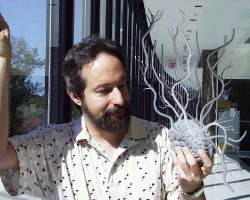The Series
 In Liquid Earth, religious robots help humans cope with
a reality that melts along a rustic Main Street in Shrub Oak, New York.
In The Lobotomy Club, a group of people perform brain surgery
on themselves to allow them to see religious visions and a "truer" reality.
In Sushi Never Sleeps, readers ponder a fractal society with
inhabitants living at different size scales. Would
different population groups, because of size, develop their
own separate societies, religion, and laws? Would some of
the tiny Fractalians believe that individuals a million
time their size even existed, or would they be relegated
to the realm of mythological creatures, like the superhuman gods of yore?
And, finally, in Egg Drop Soup, an alien object allows people to explore countless realities populated by a host of mysterious beings. In Liquid Earth, religious robots help humans cope with
a reality that melts along a rustic Main Street in Shrub Oak, New York.
In The Lobotomy Club, a group of people perform brain surgery
on themselves to allow them to see religious visions and a "truer" reality.
In Sushi Never Sleeps, readers ponder a fractal society with
inhabitants living at different size scales. Would
different population groups, because of size, develop their
own separate societies, religion, and laws? Would some of
the tiny Fractalians believe that individuals a million
time their size even existed, or would they be relegated
to the realm of mythological creatures, like the superhuman gods of yore?
And, finally, in Egg Drop Soup, an alien object allows people to explore countless realities populated by a host of mysterious beings.
|
 In Liquid Earth, religious robots help humans cope with
a reality that melts along a rustic Main Street in Shrub Oak, New York.
In The Lobotomy Club, a group of people perform brain surgery
on themselves to allow them to see religious visions and a "truer" reality.
In Sushi Never Sleeps, readers ponder a fractal society with
inhabitants living at different size scales. Would
different population groups, because of size, develop their
own separate societies, religion, and laws? Would some of
the tiny Fractalians believe that individuals a million
time their size even existed, or would they be relegated
to the realm of mythological creatures, like the superhuman gods of yore?
And, finally, in Egg Drop Soup, an alien object allows people to explore countless realities populated by a host of mysterious beings.
In Liquid Earth, religious robots help humans cope with
a reality that melts along a rustic Main Street in Shrub Oak, New York.
In The Lobotomy Club, a group of people perform brain surgery
on themselves to allow them to see religious visions and a "truer" reality.
In Sushi Never Sleeps, readers ponder a fractal society with
inhabitants living at different size scales. Would
different population groups, because of size, develop their
own separate societies, religion, and laws? Would some of
the tiny Fractalians believe that individuals a million
time their size even existed, or would they be relegated
to the realm of mythological creatures, like the superhuman gods of yore?
And, finally, in Egg Drop Soup, an alien object allows people to explore countless realities populated by a host of mysterious beings.

 YORKTOWN — Popular-science author Clifford Pickover invented a clever scale to prime readers for his new fiction series about parallel universes, artificial intelligence and transcendence.
YORKTOWN — Popular-science author Clifford Pickover invented a clever scale to prime readers for his new fiction series about parallel universes, artificial intelligence and transcendence.
